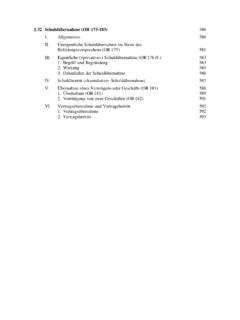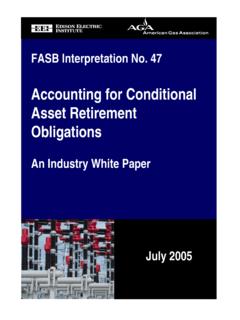Transcription of Chapter 8. LAW of CONTRACTS - Eugen Bucher
1 Chapter 8. LAW of CONTRACTS Eugen Bucher I. General remarks on the Swiss law of obligations A. Historical background and influence abroad The actual text of the Swiss Federal Code of obligations (CO) relating to CONTRACTS and tort was adopted on March 30, 1911, then presented as a supplementary part of the Civil Code (Zivilgesetzbuch, voted December 10, 1907), both entered in force as per January 1, 1912. Its text is to a large extent based on its predecessor, the ancient CO as adopted in 1881 and in force since January 1, 1883 (here "aCO"). This text is worth being mentioned not only because it is in some details preferable to the actual version but because its creation preceded that of the German Civil Code (B rgerliches Gesetzbuch, BGB) by almost two decades and necessarily -influenced the latter.
2 The characteristics of the CO recommend it as an example, representing the best of 19th century Civil Law tradition but being less complicated and more straightforward than the German code, which alone by its being focused on the artificial notion of "Rechtsgesch ft" is not easy to be absorbed by lawyers of non-German background. Therefore the influence demonstrated by the CO is remarkable in the Spanish speaking area and in the Far East. Whilst the Japanese Codification of 1898 in most respects follows the German BGB, the influence of the Swiss CO is clearly predominant in the traditional Chinese Code (actually at least in force in Taiwan, Book II), the Code of the Republic of South Korea (Part III) and the Code of Thailand (Book II).
3 In addition it may be mentioned that in 1926 under Kemal Atat rk Turkey adopted the Swiss Civil Code including the CO without major modifications1. The contract law of the CO is, as in all areas of the continental Civil Law, based mainly on the tradition of Roman Law. The CO in particular is influenced mostly by the German "doctrine of the Pandects" of the 19th century, therefore the BGB is the next of kin to the Swiss CO. The Romanist basis is still of importance for the handling of the CO not only for full understanding of the intentions of the legislator at the time of its creation, but also as a basis for future modernization and improvement of the CO which in some respect represents Roman Law oversimplified by the 19th century literature: A look into the texts of ancient Rome (the Corpus Iuris of Iustinian) or the Romanist texts of the years 1200 to 1800 can provide considerable inspiration for the solutions to come.
4 1 See in this context , The position of the Civil Law of Turkey in Western Civilisation, in < > no. 72, or in "Annales de la Facult de Droit d'Istanbul", XXXII/49 (2000), Nr. 62 Swiss Law Law of CONTRACTS { 103 123 } 104 B. Evolutions to be expected in the future Whilst in Germany a reform of the BGB is under discussion since 1980, the Swiss legislator considers a reform of the law of tort (see the following ) but is not inclined to touch the text of the contract -related dispositions, which are in most respects still perfectly satisfactory but nevertheless would in some aspects deserve an updating.
5 The following aspects should be kept in mind: - Consumer's protection is a subject as it is popular and promoted by EU-legislation, requested by the Federal Constitution (Art. 97) but neglected or systematically avoided by the legislator. First a step allowing judicial control of General Conditions (Allgemeine Gesch ftsbedingungen) is needed. Based on the experiences made abroad the undersigned is inclined to prefer a general clause allowing judges in unacceptable cases to disregard the pre-made text of the parties' agreement to a detailed codification, the precision of which would exist more in appearance than in fact.
6 - In a broader context also the abolition of the rule periculum est emptoris (the risk passes from the seller to the buyer with the conclusion of the contract , not with the transfer of the sold object; Art. 185/I CO) may be considered as being part of consumers' protection (see below and 41 and the relating text). Said rule exists not in its presentation but in the practical effect in the majority of the legal systems influenced by the French Civil Code, and the lawyers accustomed to it like the resulting legal complications. In all other systems (and in all of the German speaking areas) this rule was never adopted, and in Switzerland the view of it being outdated prevails more and more.
7 C. Basic elements of CONTRACTS The law of contract is to a large extent the same worldwide. Certainly the rules governing CONTRACTS in the English-speaking countries differ considerably from those of the Civil Law countries. Amongst the latter, when there are divergences, they are often more in appearance or theory than in the practical effects of the solutions. The similarities between Swiss and German contract law are extensive (below II). Both German and Swiss legislation have their roots in the Roman Law tradition of the 19th Century; in addition, both are influenced by the French Civil Code ("Code Napol on" of 1804), the Swiss Code showing this influence more clearly.
8 The notion of contract in Switzerland is a broad concept embracing situations perhaps elsewhere not considered CONTRACTS . Not only is donation not a unilateral declaration of the donor but a bilateral act ( contract ) between the donor and the donee (Art. 239 CO); the assignment of choices in action presupposes an agreement between the assignor and the assignee (Art. 164), the transfer of movable property requires the mutual intention of the parties to transfer property (and, in addition, the physical transfer of the goods, Art. 714 CC) and the remission of a debt the consent of the debtor (Art. 115). These acts, transferring or annulling a right under the categories of Swiss (or German) law, are qualified a special kind of contract Nr.
9 62 Swiss Law Law of CONTRACTS { 103 123 } 105 (Verf gungsgesch ft/acte de disposition; as far as real property is concerned: dinglicher Vertrag/ contract r el; see also E below). The possibility of private individuals to cause legal effects to others ("autonomy of the parties") (Privatautonomie/autonomie priv e) is restricted to CONTRACTS in the sense of bilateral acts; unilateral acts have legal consequences only insofar as a specific legal basis to that effect exists. Examples of unilateral acts are wills ruling the succession of the testator (Art. 467 CC) or termination of a contract by giving notice (but only as far as the law or contractual provisions provide a legal basis).
10 There is nothing like the assumption of obligations by unilateral declaration of the obligated party (though the law relating to negotiable instruments provides examples of obligations created by unilateral acts). D. Principle of freedom of contract Swiss law upholds to the maximum the principle of freedom of contract as developed in the seventeenth and eighteenth centuries. The main aspects are: 1. Freedom to conclude or not to conclude a contract and freedom of choice of the partner. There is no obligation to enter a contract unless a special legal provision prescribes the formation of a contract (as may be the case for public transportation and other public services or in the context of antitrust law).















